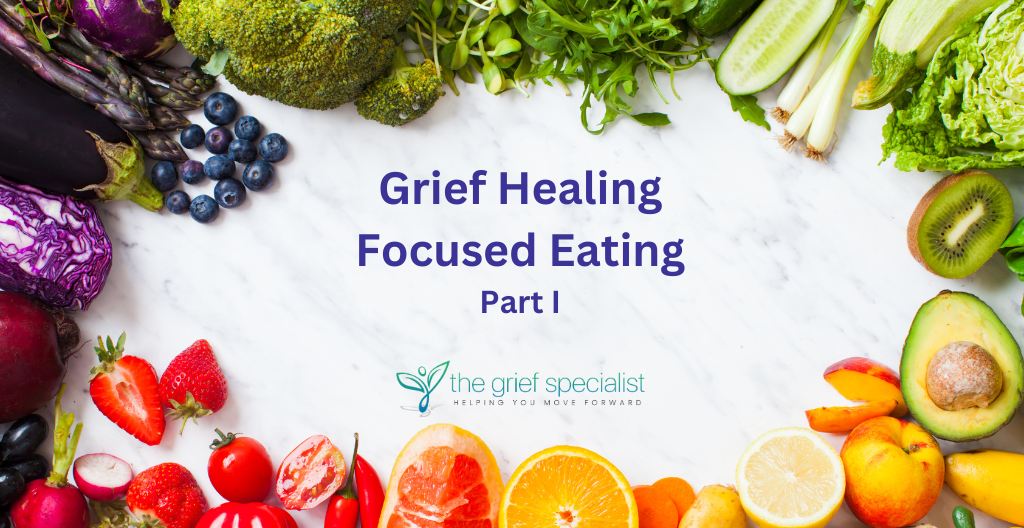Physical health is often overlooked in the grief healing process. Due to the traumatic nature of a child’s death by suicide, it is even more important to address physical health. It is a barometer that indicates how things are going in all areas of your grief journey.
Poor physical health symptoms caused by grief may include migraines, insomnia, extreme weight gain or weight loss, chronic pain and inflammation, diabetes, heart attack, stroke, high blood pressure, and broken heart syndrome. Grief will also weaken your immune system, making you prone to colds, flu, and an increased risk of autoimmune diseases. You may be experiencing one or many of these symptoms right now.
I have studied extensively about the impact of grief on your physical health. In this 5-part series, you will learn good nutritional habits and healing in grief.
PART I – Eat Real Food
In times of stress, you will more than likely crave foods that are high in fat, sugar, and salt. It is extremely easy to grab cookies or chips and use unhealthy processed foods to make you feel better. Yes, they make you feel better in the short run , however, in the long run they make you feel so much worse. They affect your blood sugar, your energy level, and your mental focus. Heavy amounts of cortisol, the stress hormone, are released during times of stress and contribute to weight gain, anxiety, and difficulty sleeping. Processed foods are also attributed to weakening your immune system, opening the floodgates to simple colds, more severe heart conditions, and oxidative stress. Oxidative stress damages your cells and can contribute to autoimmune diseases and cancer.
I want to share with you what healthy eating looks like. Ultimately the goal is to follow this as closely as possible. However, give yourself some grace if you do not. Nutrition is about health and wellness as part of your grief and healing. Pay attention to your gut. Foods high in trans fats, excess calories, additives, and salt contribute to inflammation and affect your gut health. Your gut is considered to be your “second brain” and contributes to your emotional and mental wellness.
When grieving or feeling stressed, anxious, or sad, focus on keeping up with a well-balanced diet. There are seven components to a well-balanced diet. You will add more real food and water. Reduce or eliminate gluten and dairy. Finally, reduce caffeine, alcohol, and sugar.
Times of stress and grieving cause the body to be more inflamed. It is important that during this period you do everything you can to get your inflammatory load down. That can be accomplished by eating real food. Real food does not come in boxes, cans, or microwave containers. It comes from the earth.
It is recommended to eat nine to thirteen servings of fruit and vegetables a day. Simple carbohydrates such as fruits and vegetables provide the vitamins, minerals, and antioxidants that your body needs. Whole foods have specific health benefits associated with them:
- Dark, leafy-green vegetables such as spinach, arugula, mustard greens, Swiss chard, and kale offer nutrients that decrease inflammation, enhance immune function, provide energy, and provide necessary fiber.
- Blueberries, strawberries, raspberries, and blackberries can help with memory and provide vitamin C for autoinflammatory properties and immune support.
- Sweet potatoes pack a punch of anti-inflammatory nutrients that optimize immune response and add another layer of protection.
- Other fruits such as apples, oranges, mangos, pineapples, peaches, and cherries are a good source of vitamin C, fiber, potassium, and folate. They are naturally sweet and can satisfy cravings.
- Nuts and seeds such as almonds, pecans, walnuts, sunflower seeds, and hemp seeds provide plant-based protein and healthy fats. They act as an antioxidant in your body, protecting against cellular damage. Remember, cell damage is caused by stress and unhealthy, damaged cells leave your body’s system open for autoimmune diseases, cancer, and other chronic illnesses.
- Foods rich in magnesium help to reduce the production of cortisol, the stress hormone that causes inflammation. You may find some of these are your favorites: avocados, bananas, broccoli, pumpkin seeds, and dark chocolate. Remember though, enjoy chocolate in moderation.
- Salmon is a wonderful source of healthy fatty acids, which promote brain, joint, eye, and heart health.
I understand eating may be difficult, let alone eating more fruits and vegetables. That is why I have been taking Juice Plus+ plant-based powder in a capsule for years. These nutritional capsules include spinach, kale, broccoli, raspberries, blueberry, apple, peaches, and mango. This makes it easy for me to fill the nutritional gap. It gives me the nutrition of the vitamins, minerals, and antioxidants that I do not get when I’m not eating like I should. This has helped me stay healthy during my stressful season, along with my other healthy lifestyle choices.
The day after Connor died, I doubled-up on my Juice Plus+. Knowing the damage stress has on the body, I wanted to be proactive and protect myself, because I did not want what happened to my dad and sister to happen to me. Both died of cancer shortly after extremely stressful life events. God willing, I was not going to let that happen to me. I had two daughters and grandchildren to live for. Now more than ever, they needed me.
Next week, Part II hydration and grief
#nutrition
#helpyoumoveforward
#mentalhealth
#griefrecovery
#suicide
#suicidesurvivor




